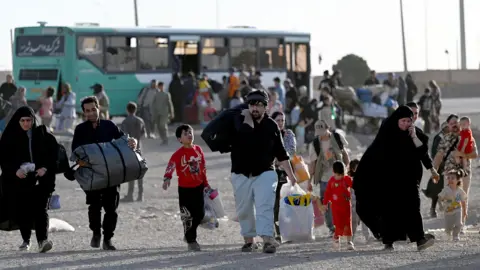More than 250,000 Afghans left Iran in June, UN says
 Getty Images
Getty ImagesMore than 256,000 Afghans left Iran in June alone, marking a surge in returns to Afghanistan since Tehran set a hard deadline for repatriations, the UN's migration agency has said.
The International Organization for Migration (IOM) recorded as many as 28,000 Afghans leaving Iran in a single day in June, after the Iranian regime ordered all undocumented Afghans to leave the country by 6 July.
The number of Afghan refugees in neighbouring Iran has swelled since the Taliban regained control of Afghanistan in 2021, many of whom live without legal status.
This has contributed to growing anti-Afghan sentiment in Iran, with refugees facing systemic discrimination.
The IOM said more than 700,000 Afghans had left Iran since January, with spokesperson Avand Azeez Agha telling news agency AFP that 70% had been "forcibly sent back".
The surge in repatriations - and the deadline - have come since Iran and Israel engaged in direct conflict with one another, beginning with Israel attacking nuclear and military sites in mid-June. A ceasefire has since been brokered.
As the two exchanged daily strikes, the Iranian regime arrested several Afghan migrants it suspected of spying for Israel, state media reported.
Following these claims, a new wave of deportations began. The semi-official Iranian Mehr news agency reported that police had been directed to accelerate deportations, though the police later denied this.
"We're scared to go anywhere because there's always the fear they might accuse us of being spies," one Afghan migrant in Iran, who we are not naming to protect their identity, told BBC Persian.
"At the checkpoints, they do body searches and check people's phones. If they find any messages or videos from foreign media on social networks, it could literally put someone's life in danger.
"Many Iranians insult us, saying things like: 'you Afghans are spies' or 'you work for Israel'."
Numerous reports in Iranian media indicate that even Afghans with valid visas and documentation have been forcibly deported. Some Afghans who were detained and later freed said they were accused by officials of betraying the country.
Arafat Jamal, the UN's refugee co-ordinator for Afghanistan, said that while there was now a ceasefire between Israel and Iran, "the consequences of that war continue".
"This movement pre-dates the war, but it has been exacerbated by it," he told BBC Pashto.
"And what we hear from the returnees is a series of actions that have caused them to come back, some of them quite coercive, others not as much."

Afghan refugees are not eligible for Iranian citizenship, even if they are born in the country, while many are unable to open bank accounts, buy SIM cards or live in certain areas. Employment opportunities are also heavily restricted, and are often limited to hard labour with low wages.
In this latest push to remove them, Iranian authorities have also urged the public to report undocumented Afghans.
"There are oppressors here, and there are oppressors there," a second Afghan in Iran said. "We migrants have never been free, never lived a free life."
Another said "the future for Afghans living in Iran looks really bleak", adding: "The police are violent and humiliating, and now even the Basij [volunteer militia] have been tasked with arresting Afghans."
The surge in repatriations comes after Pakistan accelerated its own drive to expel undocumented Afghans, saying it could no longer manage hosting them.
Mr Jamal said the number of refugees returning to Afghanistan from both Iran and Pakistan this year was in excess of one million.
While he thanked both nations for taking in millions of Afghans over the past few decades of instability, he urged them to seek a joint solution to the crisis.
The UN director said humanitarian provisions at the border had been "overwhelmed", adding: "There is simply too many people coming back."
Maulvi Abdul Salam Hanafi, deputy prime minister in the Taliban government, said on Saturday that talks with Iranian officials were under way over the issue.
The Taliban's transport minister also said it was accelerating efforts to transport refugees from the border to their homes.
